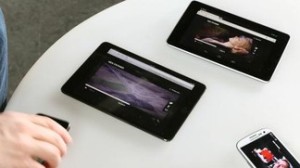Sep 3 2013
The technology developed by Shoelace Wireless enables devices connected to a Wi-Fi or cellular network to gather their bandwidth and thereby accelerate the speed of downloads. Two applications are being launched.
 © 2013 Alain Herzog
© 2013 Alain Herzog
All for one and one for all. The system binds bandwidths, or the amount of data that can be received at a specific time, from a group of devices. It uses them simultaneously, then aggregates the data obtained to deliver the final content to each unit. As a result the download speed can be doubled when two devices work together. “Videos represent 60% of the traffic on mobile networks, and the demand is growing faster than the ability of the network to provide bandwidth,” says Christina Fragouli, co-founder of the start-up. This results in increasing interruptions while viewing a video.
This ingenious system comes with many constraints. “To accomplish this, we must solve the problem of resource allocation, all the while accounting for variabilities in the wireless network,” explains Lorenzo Keller, the other co-founder of this spin-off from EPFL and University of California Irvine (UCI). The algorithms behind this system provide for any wireless device which transmits, via any network, at any time. Moreover, it necessarily does this effeciently: devices are carefully coordinated so that the overall coordination does not interfere with the benefits. Several applications are being developed. The bandwidth can be shared either when it is not in use by one of the users, or when a group of users simultaneously attempts to access the same content.
Videobee, designed for Android smartphones, will be launched any day now. This application facilitates video viewing from websites like YouTube or DailyMotion by reducing both the waiting time at the beginning of the video as well as interruptions. The download speed is doubled. The bandwidth of another device nearby is used, albeit with the agreement of the owner.
Starting in September a specific version for MOOCs (massive open online course) in Africa becomes available. On a continent where network quality is often poor, bandwidth sharing facilitates taking online courses. Students can then follow the courses at home. The bandwidths of their devices will cooperate to obtain and reliably share content quickly and, thus, at a low cost.